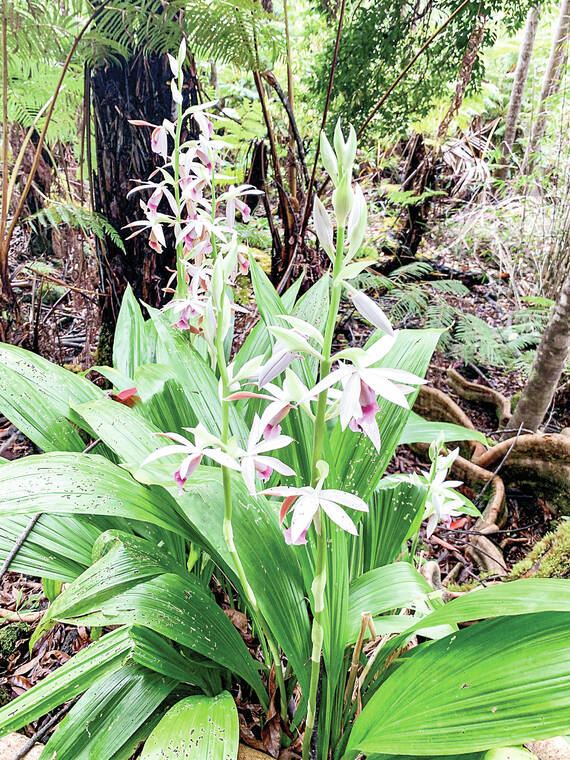Tropical Gardening: Tomorrow is Mother’s Day
You still have time to shop today at the Old Kona Airport Kona Orchid Society Spring Show and Sale. It starts at 9 a.m. and runs to 2 p.m. Not only will there be orchids, but a great variety plants that may be used to beautify the home.
If you have already found that special gift for Mom then here is an additional living gift she should appreciate. Most mothers will receive something practical, or a treat like going out for dinner, but think about a living gift as well. Flowers are for Mom but a living gift is something she can keep at the office or in the home. Every time she sees it, it will remind her of you.
ADVERTISING
Plants for use indoors are essential in homes today. With condominiums, apartment living and smaller yards becoming more common, one of the best ways to enjoy nature is by making it part of the indoors, especially on hot summer days. Even if you are lucky enough to have a home with a yard, interior landscaping brings it all together. Orchids are always appreciated but there are other plants to consider as well.
Plants are an inexpensive way to beautify the house in a professional way. If you are short on cash and your home needs a few extra pieces of furniture that you can’t afford or if you want to try a little gardening but don’t want to get grubby, then indoor gardening is for you!
The secret to successful gardening in the home is selecting the right plant for the right place and then caring for it properly. Local nurserymen or garden supply dealers can give you some help in selection as well as plant care. Here are some tips now that will keep his green thumb green.
If you are just commencing a houseplant project, start with the right container. Wooden tubs are excellent since wood prevents rapid drying out of the soil. Some containers lack drainage holes that may cause a watering problem unless you are growing plants that prefer or tolerate wet conditions like papyrus. Clay pots are fine and can be painted to blend with the colors in the home. Brass and copper are ideal for table and mantle arrangements. But, as these containers are usually small, pay careful attention to supplies of water and fertilizer. Too much or too little can be fatal to many plants.
Soil is very important for houseplants. Since they must survive on a very small amount, give them the best soil mixture available. There is no perfect mixture. However, a longtime favorite for many homeowners is a blend of one part peat and one part coarse garden soil or cinder and one part vermiculite or sponge rock. These may come already mixed for you at the garden supply store.
When choosing houseplants, select varieties that will withstand adverse growing conditions like low light intensity and dry air. To be satisfactory, houseplants must do more than merely survive under indoor conditions. They must maintain an attractive appearance with a minimum of care. Air conditioning and gas appliances, as nice to have as they are, may be rough on houseplants.
Consider such plants as Bromeliads, Aglaonema, Aspidistra, Dracaena, Monstera, Peperomia, Philodendrons, Nephytis, Sansevieria, Bird Nest Fern, Boston Fern or Rhapis Palm. These plants don’t seem to mind low light intensity or warm, dry rooms. In fact, they are sometimes called “cast iron” types.
Plants that will grow in high light include Asparagus Ferns, Strelitzia, Crotons, Aralia or Panax, Philodendron, Wandering Jew and Sansevieria. Plants that will tolerate dryer soils are Bromeliads, Jade Plant, Pandanus, Peperomia, Sansevieria and Pothos, Aloe, Sedum, and cactus. Many palms are ideal for a bold tropical effect in the home.
The proper watering of plants is important. Too big a drink or too little spells disaster. In general, most house plants require a thorough soaking, and then must be allowed to get a little on the dry side but not too dry.
Plants also like their food served at regular intervals. The best suggestion on feeding plants is to follow the directions on the container. Use a houseplant fertilizer in liquid, tablet or powder form, but with any type, go lightly. Too much can easily burn tender roots.
Here are some guides on diagnosing home plant problems. Brown tips or burned margins to leaves may mean too much fertilizer, or you’ve let the plant roots dry out, or you’ve let the plant become burned by sun or dry winds.
Yellowing and dropping of leaves may indicate gas fumes, overwatering, poor drainage or poor soil aeration. Small leaves suggest tight or heavy soil mixture, lack of fertilizer or not enough moisture.
Weak growth or light green color on otherwise healthy foliage perhaps indicates too much light, lack of fertilizer, root rot or poor root systems. Yellowing, wilting, or soft-weak growth may mean too much heat or root injury.
Small leaves and long internodes are signs that the plants are growing with too little light or the temperature is too warm.
White, cottony masses on leaves or stems may be mealy bugs or cottony cushion scale. A soap bath will help. Brown spots or streaks on the leaves may mean a bacterial or fungus disease. Disease control will depend on the type of bacteria or fungus. Sanitation is the best prevention. Removing diseased leaves will help. Several fungicides are available at your local garden supply. Again, follow label directions.
Since house conditions are usually less than ideal, it’s a good idea to change plants once in a while. Don’t expect a plant to live forever inside.
Many indoor gardeners have a special corner in the home for houseplant rejuvenation. If you don’t have this kind of plant hospital, then replacing tired old plants with new ones occasionally will keep your interior garden in top shape.


